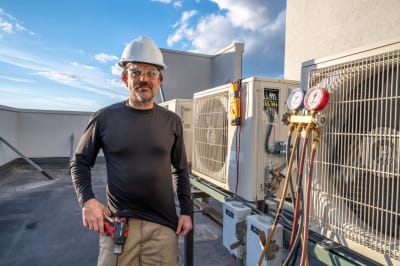Home and building inspectors examine houses to ensure structural integrity and safety. While there are different types of building inspectors, each with its own specific goal, the common characteristic is that they know the standards for a building to be considered “properly designed.”
And thankfully, this knowledge and expertise is in great demand from both public and private organizations alike.
A career as a home and building inspector can be fulfilling, but before you can get started, you must clearly understand what the job entails.
To that end, we have provided below an in-depth guide containing everything you need to know about the home and building inspection field, including crucial aspects such as the steps necessary to become one, the certification and licensing requirements, and the potential salary to expect.
What Do Home and Building Inspectors Do?
Home and building inspectors thoroughly examine houses and buildings to ensure they meet the proper standards. Their inspections often encompass a handful of structures and areas.
For instance, a building inspector may examine dams, bridges, walls, public structures, and residential and commercial buildings.
Secondly, they should consider not only the overall structural integrity of a building but also the integrity of its heating systems, electrical components, ventilation, refrigeration, and air-conditioning, among others.
Home and Building Inspector Work Environment
Home and building inspectors often move around a city since they are always needed at work sites and newly erected buildings—most professionals in the fieldwork for the local government. Still, a great deal also works with engineering services, construction companies, and state governments, and of course, they may also be self-employed.
As one would expect, home and building inspectors spend a lot of time outdoors, but it is also common to be in the office reviewing blueprints and writing reports.
Lastly, most inspectors work full-time and maintain regular business hours, but they must also be ready to deal with emergencies that may occur at any time.
How To Become a Home and Building Inspector
The following are the typical steps involved in becoming a home and building inspector:
1. High School Diploma and Work Experience
Employers always prefer to work with inspectors who at least have a high school diploma or a GED equivalent. Many states and local governments also have the exact requirements for licensure.
Another area that is always in demand is the issue of work experience. And while, as we’ll see below, you don’t necessarily need to have prior work experience to become an inspector, it comes in handy regarding employment seeking.
This is because many inspectors learn the trade on the job, and having prior experience makes the process much faster and easier.
2. Training Program
Prior work experience can be valuable for a building and home inspector, but it is not mandatory. Those without previous experience can begin their journey toward being an inspector by enrolling in a formal training program.
Here they’ll learn about all of the specialty areas available to them, along with courses in construction technology, home inspection, blueprint reading, geometry, and algebra, among others.
Usually, a certificate or associate degree program will be enough to seek employment. Sometimes, however, employers may seek only candidates with a bachelor’s degree in engineering or architecture.
3. On-the-Job Training
Lastly, as mentioned earlier, aspiring inspectors may also acquire training on the job, particularly if they have prior experience in construction. During their training, they will learn about code ordinances and specifications.
Additionally, whether or not an inspector can acquire training on the job is sometimes down to state and municipality law. This is because while some places allow training on the job, some don’t.
Home and Building Inspector Specializations
Home/building inspector is a generic term encompassing several fields. What differentiates these fields, even though their duties may be the same, is the goal of their inspections.
For instance, while building inspectors check buildings’ structural quality to meet government codes and safety, home inspectors typically examine houses on behalf of home sellers or buyers.
Other areas of specialty include coating inspectors, electrical inspectors, elevator inspectors, mechanical inspectors, plans examiners, plumbing inspectors, public work inspectors, and special inspectors who make sure that construction works are carried out according to specific design criteria.
Home and Building Inspector Salary
According to the Bureau of Labor Statistics, home and building inspectors earned a median annual salary of $61,640 in May 2021. Those who fell into the bottom 10% took home less than $38,110, while the top 10% earned more than $100,520 in annual salary.
Those who worked in engineering services earned the most, with an annual average salary of $62,580, followed by those who worked in construction, with an average yearly salary of $61,360. Local and state government inspectors round up the list with annual averages of $61,190 and $61,170.
Other factors that can influence how much one earns yearly as a building inspector are experience and certification level. Those who have been on the job for longer may get to negotiate more enormous salaries for work on larger contracts. The same goes for inspectors with higher certification credentials.
Home and Building Inspector Job and Career Outlook
The BLS predicts a 4% decline in demand for building and construction workers between 2021 to 2031. The decline is set to arise due to more remote inspection, which will lead to the need for fewer state and local government inspectors.
Despite the decline, more than 14,800 job openings will still be available for aspiring inspectors within that period. Many of these will result from positions opening up due to inspectors moving on to other professions or retiring.
Additionally, continued public interest in the safety standards of buildings will also lead to more companies coming up and hiring credentialed inspectors. Improving the quality of buildings and other structures will also play a role.





